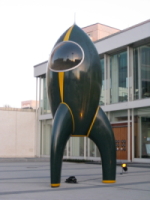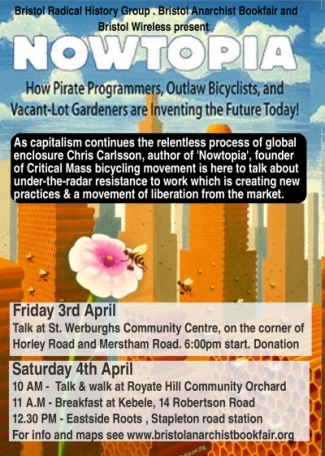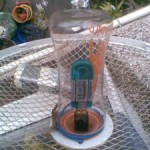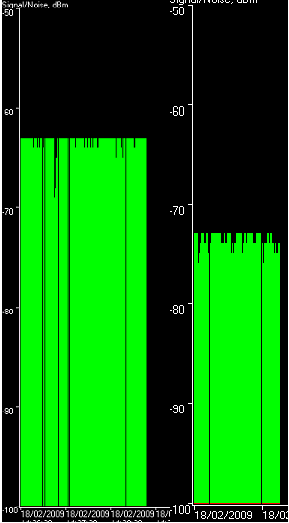In the Bristol area (and other less favoured parts of the 3rd planet of a lowly star on the end of an unfashionable arm of the galaxy), Bristol Wireless has built up a fair reputation as übergeeks. We’ve also done some work beyond Bristol too.
Building on the latter, Bristol Wireless now wishes to extend the benefits of its work further afield, initially to Western Europe. We are therefore today announcing the progress of the development work we have been doing on our own communications satellite.
“At its hi-tech facility in St Werburghs, BW techs have for some time been building an open source satellite from recycled and donated parts, using the combined skills of its team of volunteers”, said BW spokesperson Avril Fuell. “Coming from a wide range of technological and engineering backgrounds, they have a superb set of skills we have been able to deploy on this project.”
 The satellite is about the size of a domestic washing machine and all rumours concerning the use of a washing machine to build it are, of course, completely true.
The satellite is about the size of a domestic washing machine and all rumours concerning the use of a washing machine to build it are, of course, completely true.
The satellite will of course be running Linux and it is believed a specially modified version of Voyage Linux is being developed for the project and, once in orbit, the satellite’s footprint will cover most of western Europe.
The main obstacle facing the project at present is the lack of a suitable launch vehicle. However, Germany’s Chaos Computer Club has been contacted with a view to borrowing their rocket, as shown in the accompanying picture (which is by courtesy of Andrew Kilpatrick).
“We hope to have our comms satellite launched within the year,” said BW spokesperson Avril Fuell. “The countdown has started and we should have a fully deployed working satellite in geostationary orbit just after midnight on 31st March next year, although this might slip to the following day.” 😉

 The satellite is about the size of a domestic washing machine and all rumours concerning the use of a washing machine to build it are, of course, completely true.
The satellite is about the size of a domestic washing machine and all rumours concerning the use of a washing machine to build it are, of course, completely true.
 For those who don’t know her, Ada (or Augusta Ada King, Countess of Lovelace) is mainly known for having written a description of Charles Babbage’s early mechanical computer, the analytical engine. She is today appreciated as the “first programmer” since she was writing programs, i.e. manipulating symbols according to rules, for a machine that Babbage had not yet built. This was quite an achievement for a woman in Victorian England and one who only lived to the age of 36.
For those who don’t know her, Ada (or Augusta Ada King, Countess of Lovelace) is mainly known for having written a description of Charles Babbage’s early mechanical computer, the analytical engine. She is today appreciated as the “first programmer” since she was writing programs, i.e. manipulating symbols according to rules, for a machine that Babbage had not yet built. This was quite an achievement for a woman in Victorian England and one who only lived to the age of 36.
 Opening my inbox this morning revealed the arrival of news from Europe (Not Brussels though; no need to shudder and fear the worst! Ed.😉 ). Yesterday, 11th March, saw the Free Software Foundation Europe (FSFE) celebrating its 2^3 (eighth) birthday. Over that time, the FSFE has been working for basic rights and freedoms in a society increasingly driven by software.
Opening my inbox this morning revealed the arrival of news from Europe (Not Brussels though; no need to shudder and fear the worst! Ed.😉 ). Yesterday, 11th March, saw the Free Software Foundation Europe (FSFE) celebrating its 2^3 (eighth) birthday. Over that time, the FSFE has been working for basic rights and freedoms in a society increasingly driven by software.



 Ben, our server admin, has just announced the update of the Bristol Wireless
Ben, our server admin, has just announced the update of the Bristol Wireless  Pete, the Chair of Bristol Wireless, has posted details to our daily mailing list of a petition on the 10 Downing Street website, requesting the British Prime Minister to promote greater use of open source software in UK schools. At present, use of free and open source software in schools is very much a minor pursuit, relying on the enthusiasm of individual schools’ teaching and IT staff.
Pete, the Chair of Bristol Wireless, has posted details to our daily mailing list of a petition on the 10 Downing Street website, requesting the British Prime Minister to promote greater use of open source software in UK schools. At present, use of free and open source software in schools is very much a minor pursuit, relying on the enthusiasm of individual schools’ teaching and IT staff. It’ll be a ‘Show & Tell‘, an open invite to anyone to come along with something and enthuse about it for a few minutes: the ‘something’ can be a piece of kit or an interesting project – it’s totally up to you. Organisers Mike and Rachel would also like someone from either Bristol Wireless or BBLUG to talk about a Linux topic for a short period (5 to 15 minutes). If you can help out, please contact them at dorkbotbristol at googlemail.com (replacing the at with the @ sign).
It’ll be a ‘Show & Tell‘, an open invite to anyone to come along with something and enthuse about it for a few minutes: the ‘something’ can be a piece of kit or an interesting project – it’s totally up to you. Organisers Mike and Rachel would also like someone from either Bristol Wireless or BBLUG to talk about a Linux topic for a short period (5 to 15 minutes). If you can help out, please contact them at dorkbotbristol at googlemail.com (replacing the at with the @ sign).